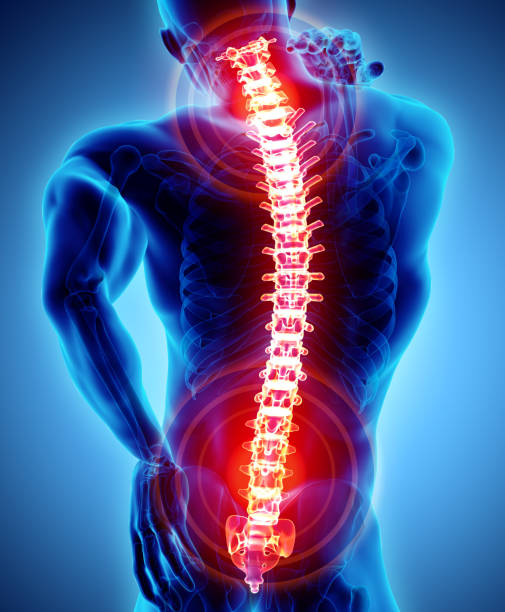A multitude of events, including traumas, infections, and diseases, may induce myalgia. Muscle discomfort may be either temporary or persistent. DOMS (delayed-onset muscular soreness) arises after activity. You may take steps to prevent and cure muscle pain and its underlying causes.
At the clinic office, a doctor and a patient discuss back pain therapy.
OVERVIEW
What precisely is this muscle discomfort?
Myalgia, often known as muscular pain, is a symptom that may signal an injury, infection, disease, or other health problem. You might have a continuous dull discomfort or intermittent severe aches. While some people experience muscle discomfort throughout their body, others only feel it in certain areas. Each person may feel muscle soreness differently.
Who is at risk of developing muscle pain?
Muscle aches may happen to anybody, regardless of age or gender. If you engage in a new kind of physical activity or make major modifications to your regular exercise routine, you may have delayed-onset muscle soreness (DOMS). Muscle soreness after exercise may last anywhere from six to twelve hours, and it can last up to forty-eight hours. You will feel pain while your muscles repair and strengthen.
In addition to muscle discomfort, what other symptoms may one experience?
In addition to muscle soreness, you may be suffering the following symptoms:
Discomfort in the joints.
Cramping of the muscles.
Spasms in the muscles.
POSSIBLE REASONS
What is the source of muscle pain?
Muscle pain may be caused by a number of circumstances, including the following:
Autoimmune conditions.
Infections.
Injuries.
Medications.
Disorders of the neuromuscular system.
What autoimmune disorders produce muscular pain?
Autoimmune diseases are those that occur when the body’s immune system mistakenly attacks the body itself. A healthy immune system is required to fight pathogenic germs and viruses.
Autoimmune illnesses that cause muscle pain include:
Polymyositis and inclusion body myositis are two of the most frequent inflammatory myopathies.
Lupus.
Multiple sclerosis (MS) (MS).
What are the many types of infections that might cause muscular pain?
Bacterial and viral infections may produce aches and pains throughout the body. Depending on the underlying cause, you may also have fever, nausea, and swollen lymph nodes.
Infections in the following groups may cause painful muscle conditions:
Colds and flu are equally contagious.
Lyme illness and Rocky Mountain spott fever have both lately been reported (infections spread through tick bites).
Malaria.
Trichinosis (a foodborne ailment) (a foodborne illness).
What are the many types of injuries that might cause muscular pain?
You run the danger of getting muscle pain from overuse whenever you utilise the same muscles for an extended length of time, whether at work or during exercise.
Additional sources of muscle pain include the following types of injuries:
Pain and discomfort in the abdomen.
Back sprains and strains are possible.
Numerous fractures and major injuries occurred.
Myofascial pain syndrome is caused by repetitive actions (overuse).
Tendinitis.
Tendinosis.
Which medications are causing my muscle pain?
Certain medications and therapies may cause pain, either briefly or permanently. Some medicines may cause myositis, or inflammation around muscle cells, or they may trigger pain receptors in the muscle. These therapy include the following:
Chemotherapy and radiation therapy are two cancer treatments.
Medicines for high blood pressure, particularly those classified as angiotensin-converting enzyme inhibitors (ACE).
Statins are drugs that help lower cholesterol levels.
What neuromuscular diseases cause muscle pain?
Neuromuscular illnesses may damage both muscles and the nerves that control them. They have the potential to induce muscular weakness and pain. These criteria include the following:
Amyotrophic lateral sclerosis (ALS), often known as Lou Gehrig’s illness.
Muscle wasting
Myasthenic syndrome severe
Atrophy of the spinal muscles (SMA).
What other ailments, except those described above, cause muscle pain?
In addition to these conditions, the following may cause muscle pain:
Sarcomas (soft tissue tumours) and leukaemia are examples of cancers (blood cancer).
Persistent exhaustion syndrome
The Compartment Syndrome (a buildup of pressure in muscles).
Fibromyalgia.
Electrolyte imbalance disruption (minerals in your blood, such as calcium, magnesium, sodium and potassium).
Hypothyroidism (low thyroid activity) (underactive thyroid).
Atherosclerosis of the peripheral arteries (PAD).
The sensation of being stressed and anxious.
MEDICATION AND ASSISTANCE
How can doctors establish the underlying reason of a patient’s muscle pain?
If you experience muscle discomfort and don’t know what’s causing it, or if the pain is severe or chronic, your healthcare provider may order the following tests for you:
Examining the levels of enzymes, hormones, and electrolytes in the blood and checking for infections.
MRI or CT scans are used to rule out or rule in a muscle injury or damage.
Electromyography is a technique for detecting electrical activity in nerves and muscles.
A muscle biopsy will be performed to look for changes in muscle tissue that might indicate neuromuscular diseases.
How is muscular pain controlled or treated?
The following remedies may help you feel better depending on the underlying problem:
Relax and make sure the hurting spot is elevated.
Alternate between applying cold and heat to the afflicted region to reduce inflammation and increase blood flow.
You may either take a warm shower or relax in a heated Epsom salt bath.
Utilize pain relievers that do not need a prescription (aspirin, acetaminophen, ibuprofen, naproxen).
Try with alternative therapies such as massage, acupuncture, or meditation.
WHEN IS A VISIT TO A DOCTOR REQUIRED
When should I schedule a doctor’s appointment?
If you have any of the following symptoms, you should call your healthcare provider right away:
Aches and pains in the chest
Fever.
Inability to regulate one’s bladder
Muscle sluggishness
Maybe the pain is becoming worse.
Numbness or tingling in the limbs are symptoms.
You have a letter from the Cleveland Clinic.
Cure
Muscle ache and soreness are regular occurrences for practically everyone. Rest, stretching, and pain medication may all help relieve transitory muscle soreness. Muscle pain, whether chronic or severe, makes it harder to enjoy previously enjoyed activities. If you have an illness that causes chronic muscle pain, it is critical that you consult with your primary care physician about treatment options.
Physicians often use Pain o Soma 500mg (which includes carisoprodol as an active component) for muscle pain. Pain O Soma treats severe instances of acute and chronic muscular pain caused by sprains and other muscle injuries.
People may take it only when approved and under the guidance of a doctor for up to three weeks. Its effects are frequently felt within 30 minutes and may last for up to 6-8 hours.
It is taken orally three times a day, soon before bedtime, and is available in tablet form. As a side effect, it often produces headaches, lightheadedness, and weariness.
Significant side effects include addiction, allergic reactions, and seizures. Carisoprodol was approve for medicinal use in the United States in 1959.
200 MG Tapaday (Tapentadol) (Tapentadol) Buy just one 1.6 pill. Tapaday 200mg is used to treat severe acute pain, as well as pain cause by an accident, surgery, musculoskeletal issues, and diabetic neuropathy.



